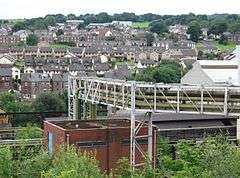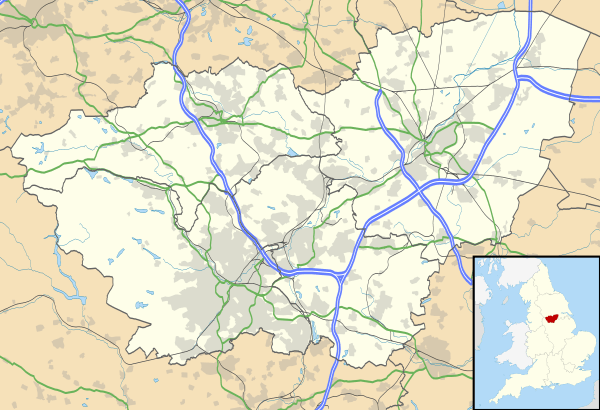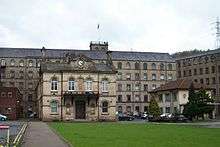Stocksbridge
Stocksbridge is a town and civil parish, in the City of Sheffield, in South Yorkshire, England. Historically part of the West Riding of Yorkshire, it lies just to the east of the Peak District. The town is located in the steep-sided valley of the Little Don River, below the Underbank Reservoir. It blends into the areas of Deepcar, Bolsterstone and the eastern end of Ewden valley around Ewden village, which are also within the civil parish. The population of the civil parish as of the 2011 census was 13,455.[2]
| Stocksbridge | |
|---|---|
 Leisure centre from the steel works | |
 Stocksbridge Location within South Yorkshire | |
| Population | 9,869 (2011)[1] |
| Civil parish |
|
| Metropolitan borough |
|
| Metropolitan county | |
| Region | |
| Country | England |
| Sovereign state | United Kingdom |
| Post town | SHEFFIELD |
| Postcode district | S36 |
| Dialling code | 0114 |
| Police | South Yorkshire |
| Fire | South Yorkshire |
| Ambulance | Yorkshire |
| UK Parliament | |
Early history
Throughout the whole of recorded history, up until the early 18th century, what is now Stocksbridge was a deciduously wooded valley which ran from Midhopestones at its northwestern extremity to Deepcar at its southeastern end. A river, originally called the Hunshelf Water but afterwards renamed the Little Don, ran through the valley. This river was also, unofficially, called the Porter, probably on account of its peaty colour. A dirt road, connecting Sheffield with Manchester, ran through the woods adjacent to the river. There were a few stone houses in the valley and a sprinkling of farms on each hillside.[3]:38
In 1716 John Stocks, a local farmer and landowner, occupied a fulling mill halfway along the valley where a flood plain, created by meltwater at the end of the last ice age, extended southwest from the river. Here he reputedly built a footbridge over the river, perhaps so that his workforce could reach the mill from their homes on the north side. This originally wooden structure, Stocks' Bridge, gave the place its name, not only because it was about the only thing there apart from the mill itself,[3]:40 but also because as a crossing place it appeared under that name on Thomas Jeffrey's map of 1772, so establishing itself as a place name. On various occasions this bridge was destroyed by flooding, and it was eventually replaced by a stone structure in 1812.[4]
In 1794 three businessmen, Jonathan Denton, Benjamin Grayson and Thomas Cannon,[3]:15 built a large cotton mill extremely close by, or possibly upon, the site of the original mill.
The parish church of St Matthias was consecrated in 1890.
Steel industry
The valley bottom today is almost entirely occupied by steel works.
Samuel Fox acquired the old cotton mill in 1842, at first renting it from its then owner, Joshua Newton. Nine years later, in 1851, he purchased the mill outright from Joshua's son, Thomas Newton. Fox converted the place to use as a wire mill, and built much of the infrastructure of Stocksbridge, primarily to house his new workforce and to supply their needs. The wire was initially for textile pins, but around 1848 the business expanded to include wire for umbrella frames which led to Fox developing the “Paragon” umbrella frame in 1851.
The business continued to expand, and extended into different products, but underwent a major change in direction in the early 1860s when Fox realized that he could save large amounts of money by making his own steel for the wire, rather than buying it in. Furnaces and a rolling mill were installed, which in turn allowed the production of railway lines and springs. The business was incorporated into a limited company in 1871.
Between 1872 and 1877 a railway line was built to link the works with the Manchester, Sheffield and Lincolnshire Railway at Deepcar. This was the Stocksbridge Railway, which existed as a subsidiary company until 1992.

Samuel Fox & Co joined Steel, Peech and Tozer at Templeborough to form the United Steel Companies (USC) following the First World War. From then on the products of the USC sites were coordinated so that each works specialised in set products. Fox’s specialised in special steel produce such as spring steel and stainless steels. This developed into the manufacture of high-quality steel for the aviation industry. One specialised department assembled and tested springs for Rolls-Royce cars.
During the Second World War, 'Sammy Fox's' Steelworks was kept busy as part of the war effort. During the Sheffield Blitz by the Luftwaffe, the bombers used the dam at the end of Stocksbridge as a turning point for their run back toward Sheffield.
Following nationalisation in 1967, the British Steel Corporation split the stainless steel departments off into a separate business which by 2004 had become part of Outokumpu.
During the 1980s and 1990s the Stocksbridge works was part of the United Engineering Steels group (a joint venture between British Steel and GKN) and was known as "Stocksbridge Engineering Steels".
In 1999 the works were taken over by Corus and are part of the Corus Engineering Steels (CES) group. Although for several years Corus ran at a loss, it returned to profit, in part helped by a rise in demand for steel caused by Chinese economic activity.
Steel manufacture in Stocksbridge had always been by melting iron and steel firstly in crucibles (from 1860), then Bessemer converters (from 1862) and Siemens Open Hearth Furnaces (from 1899 until 1968) and lastly Electric arc furnaces (from 1939 until 2005). Iron has never been produced from iron ore at Fox's, by any method.
In October 2006, Corus was taken over by the Indian company Tata. Corus Engineering Steels (Stocksbridge site) was renamed Tata Steels Speciality. During the 2008 recession Stocksbridge works reduced its workforce and output, focusing on producing lower quantities of high-value product for the aerospace and oil and gas markets. After the recession the company returned to profitability and began investing once again. In 2011 £6.5 million was invested in boosting the site's ability to produce aerospace steel, and further developments were planned for 2013.[5]
However in December 2015 Tata came under investigation by the Serious Fraud Office in connection with the alleged falsification of certificates guaranteeing the quality of its speciality steels. This was then followed in early 2016 by an announcement from Tata that they would be selling their entire steelmaking interests in the UK, due, they said, to crippling electricity prices in the UK which are more than double the price in the European Union and in other competing countries, and to large volumes of cheap steel which are being exported to the west by China. If a buyer could not be found, then steelmaking in the Stocksbridge valley would finally end, after almost 160 years.[6][7]
However on 9 February 2017 it was announced by Tata and by the Liberty House Group, that the latter had purchased Tata's entire UK steelmaking operation for GBP 100 million. This has secured the continuation of steelmaking in the Stocksbridge valley.[8][9]
Transport
The main road from Sheffield to Manchester originally passed through the town until the A616 Stocksbridge bypass opened in 1989. The new road links the M1 motorway at Junction 35A (and J36) to the A628 (which is one of the main trans-Pennine routes from Sheffield to Manchester) bypassing the towns of Stocksbridge and Deepcar, diverting the steelworks traffic away from passing through the town.
Stocksbridge has multiple bus services that connect the town to Sheffield City Centre, Middlewood tram stop and Barnsley Interchange. The SL1/SL1A (operated by Stagecoach Yorkshire) is an every 12 minute service, connecting with the Sheffield Supertram service to the centre of Sheffield or Hillsborough. Service 57 (operated by Stagecoach Yorkshire) runs hourly (every 30 minutes at peak times) from the far end of Stocksbridge, Unsliven Bridge, all the way into Sheffield City Centre. Service 201 (operated by Powell's Bus) runs hourly connecting Stocksbridge to Chapeltown. Service 23/23a (Stagecoach) connects Stocksbridge to Millhouse Green hourly, and Barnsley twice a day.
Culture
The British Steel Stocksbridge Band [sic] is credited with a tune called "Slaidburn" (1994) in the trailer of the 1997 film The Full Monty. Stocksbridge Engineering Steels Brass Band has since been renamed to Unite the Union Band and moved rehearsals to central Sheffield. Deepcar Brass Band remains locally. Nearby Bolsterstone is home to a well-known male voice choir led by male vocalist Alan Rodgers, particularly noted for its performances of Sheffield local carols.[10] Stocksbridge has a strong amateur theatre group called Steel Valley Beacon which produces Shakespeare and other plays every year.
Mathcore band Rolo Tomassi were formed and are still based in Stocksbridge.
Sport
The town's local football club is Stocksbridge Park Steels was founded in 1986, following the merger of Stocksbridge Works and Oxley Park FC. The home ground of Stocksbridge Park Steels is Bracken Moor, located near the top of the valley. They play in the Northern Premier League Division One South and also organise many youth teams, from the age of 8 to 18.
Stocksbridge Church was the first to represent the town in the FA Cup, in 1910.
Notable residents
- Geoff Denial, professional footballer for Sheffield United and Oxford United, was born in Stocksbridge.[11]
- Peter Eustace, former Sheffield Wednesday midfielder, was born in Stocksbridge.
- Oli Sykes, vocalist of Bring Me the Horizon and owner of Drop Dead Clothing, grew up in Stocksbridge and attended Stocksbridge High School.[12]
- Chris Wilder, Sheffield United manager, was born in Stocksbridge.[13]
References
- 35 Output areas make up Stocksbridge alone (Not including Deepcar, Midhopestones, Upper Midhope and Bolsterstone) http://ukcensusdata.com/stocksbridge-and-upper-don-e05001063#sthash.3EoM4KJv.7OXM9Gt8.dpbs%5B%5D
- UK Census (2011). "Local Area Report – Stocksbridge Parish (1170210933)". Nomis. Office for National Statistics. Retrieved 1 October 2018.
- Branston, Jack (1983). History of Stocksbridge (1st ed.). Stocksbridge Town Council.
- "Stocksbridge Area". Stocksbridge and District History Society. Retrieved 12 December 2016.
- Rankovic, Ljuba. "Business Link Magazine". blmforum.net. Archived from the original on 2 February 2015. Retrieved 2 February 2015.
- Ruddick, Graham (8 April 2016). "Tata Steel crisis deepens with senior staff suspended amid SFO probe". The Guardian. Retrieved 12 December 2016.
- Ruddick, Graham; Stewart, Heather (30 March 2016). "Tata Steel to sell off entire British business". The Guardian. Retrieved 12 December 2016.
- "Tata Steel agrees to sell speciality steel biz to Liberty House - Latest News & Updates at Daily News & Analysis". dnaindia.com. 9 February 2017. Retrieved 12 April 2018.
- "Liberty closes deal to acquire Tata Speciality Steels - Liberty House Group". www.libertyhousegroup.com. Retrieved 12 April 2018.
- "Local Carol Sings 2015". localcarols.org.uk. 2015. Retrieved 10 December 2015.
- "Player statistics: Geoff Denial". Rage Online. Retrieved 7 May 2019.
- "Oliver Sykes biography". artistwiki.com. Retrieved 2 February 2015.
- "Stocksbridge". Barry Hugman's Footballers. Retrieved 14 May 2017.
External links
- Sources for the study of the history of Stocksbridge Produced by Sheffield City Council's Libraries and Archives